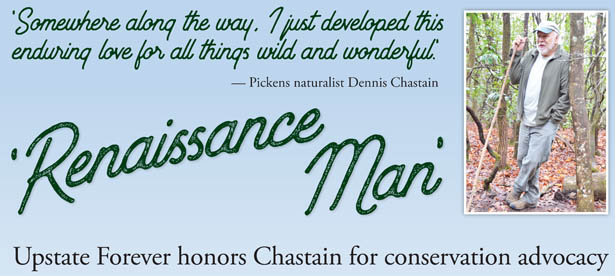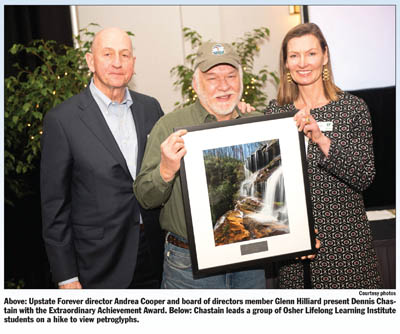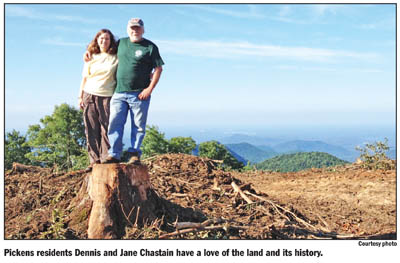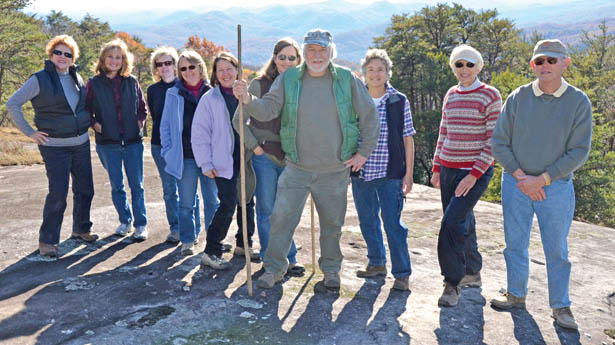Upstate Forever honors Chastain for conservation advocacy

By Jason Evans
Staff Reporter
jevans@thepccourier.com
GREENVILLE —
Pickens resident Dennis Chastain was recently recognized by Upstate Forever for his decades of dedication to preserving the history and beauty of this area.
Chastain received the Extraordinary Achievement Award at the 2019 ForeverGreen Awards Luncheon held Feb. 19 in Greenville.
The Extraordinary Achievement Award recognizes an individual who, through dedication and leadership, has made an extraordinary  contribution to conservation and/or sustainable growth in the Upstate, according to a news release from Upstate Forever.
contribution to conservation and/or sustainable growth in the Upstate, according to a news release from Upstate Forever.
The award recognizes Chastain for this more than 40 years of work as a writer, historian, botanist, guide and conservation advocate, the release said.
Chastain is an award-winning outdoor writer, historian, tour guide and interpretive naturalist.
“I’ve written about everything from black bears to butterflies,” he said in a video shown at the awards ceremony. “You’d think there were no more topics, but actually there’s always something to write about.”
Chastain is currently the Blue Wall vice president of the Pickens County Historical Society. Among his work for that group is helping to secure funding for a historically accurate reconstruction of the colonial era Fort Prince George.
“I think the best way to describe Dennis is ‘Renaissance Man,” Upstate Forever founder Brad Wyche said in the video. “Dennis has been such a great ally for Upstate Forever and other conservation organizations on so many important initiatives in the Upstate over the last 40 years. He is such a treasure for the Upstate.
Chastain has “helped us learn more about the region in which we live,” he said.
“He’s helped make the Upstate a much better place,” Wyche said.
 Chastain’s roots in the area run deep. His ancestors arrived in the region in 1796.
Chastain’s roots in the area run deep. His ancestors arrived in the region in 1796.
He and his wife, Jane, live on the Chastain family’s homeplace in the shadow of Table Rock.
In the video, Chastain said he spent a lot of his summers growing up at the old homeplace.
“Somewhere along the way, I just developed this enduring love for all things wild and wonderful,” Chastain said.
Speaking with the Courier, Chastain said the award “came out of the blue.”
“It’s honestly just incredible,” he said. “It was an absolute, complete surprise.”
He’s the sixth person to receive the award.
“I have the greatest respect for Upstate Forever as an organization,” Chastain said. “Jane and I have been members since the organization consisted of three people. We’ve been associated with Upstate Forever for a long time. It made the honor even greater.”
Filling out a questionnaire in preparation for the award ceremony sent him on “a journey back through time,” he said.
“One of the questions was ‘what was your greatest environmental or conservational success?’” Chastain said.
One was a battle in the 1980s to keep the waters near Table Rock pristine after a developer proposed a sewage treatment plant.
“They were proposing to discharge the effluent into the Oolenoy River at the very point where the wildlife department stocks trout,” Chastain said.
A concerned group appointed him to “take on the task of fighting this  thing,” he said.
thing,” he said.
“It really was a David vs. Goliath story,” Chastain said. “Just me and my powers of persuasion and the documents.”
Chastain studied the permitting system and “found a way to beat them,” he said.
“You’ll notice there’s no sewage treatment plant on the Oolenoy River,” Chastain said with a laugh.
“Rivers at Risk,” one of his articles for South Carolina Wildlife magazine, led to statewide changes. His research revealed that two-thirds of the state’s lakes, rivers and streams were classified by DHEC as Class B, a classification that permitted fecal coliform bacteria at levels considered “unsafe for swimming and fishing,” he said. That was a direct violation of the Clean Water Act’s “fishable/swimmable” standard, Chastain said.
“The agency charged with protecting our health was allowing discharges to the point where it wasn’t safe to swim or fish,” he said. “This was outrageous.”
The article created “a drumbeat of support” from residents, and six weeks after its publication, Chastain received a call from Mike Jarrett, then the executive director of DHEC.
“He said that he had read my article and made the decision while actually reading the article that they were going to totally eliminate the Class B classification and revamp their entire stream classification system,” he said. “Amazing. It was honestly one of the most gratifying moments of my life.”
Chastain says he’s used a quote from President Theodore Roosevelt as his guiding philosophy in life.
“‘Do what you can, with what you have, where you are,’” he said. “That says it all.”





























